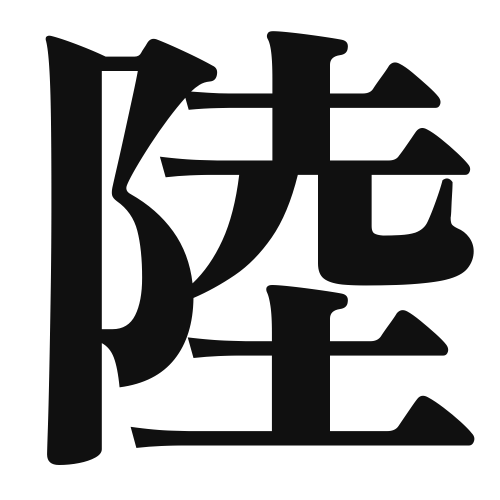1. Overview of Meaning
The kanji “陸” (pronounced “riku” in Japanese) means “land” or “shore.” It refers to solid ground as opposed to water, and is often used in contexts related to geography and nature.
2. Formation and Radical
The kanji “陸” is a compound character (会意文字) that combines elements to convey its meaning. It consists of the radical “阜” (which represents a hill or mound) and the phonetic component “陸,” which helps indicate its pronunciation.
The radical “阜” is associated with landforms, reinforcing the meaning of “陸” as it relates to land and terrain.
3. Examples of Usage
Common words and phrases that include “陸” are:
- 陸上 (りくじょう, rikujo) – “land” or “on land”
- 陸軍 (りくぐん, rikugun) – “army” (land forces)
- 陸地 (りくち, rikuchi) – “land” or “landmass”
Example sentence in daily conversation:
「私たちは陸上でキャンプをする予定です。」(Watashitachi wa rikujo de kyanpu o suru yotei desu.) – “We plan to camp on land.”
4. Synonyms and Antonyms
Similar kanji with related meanings include:
- 土地 (とち, tochi) – “land” (referring to property or ground)
- 地面 (じめん, jimen) – “ground” (the surface of the earth)
Antonyms include:
- 海 (うみ, umi) – “sea” or “ocean” (the opposite of land)
- 水 (みず, mizu) – “water” (which contrasts with solid ground)
5. Cultural and Historical Background
The kanji “陸” has significant relevance in Japanese culture, particularly in relation to geography and nature. It is often used in expressions that describe the natural landscape.
Proverbs and idiomatic expressions include:
- 「陸に上がる」(riku ni agaru) – “to come ashore,” often used metaphorically to mean returning to safety or stability.
- 「陸の孤島」(riku no kodō) – “an isolated island on land,” referring to a place that is cut off from the outside world.
